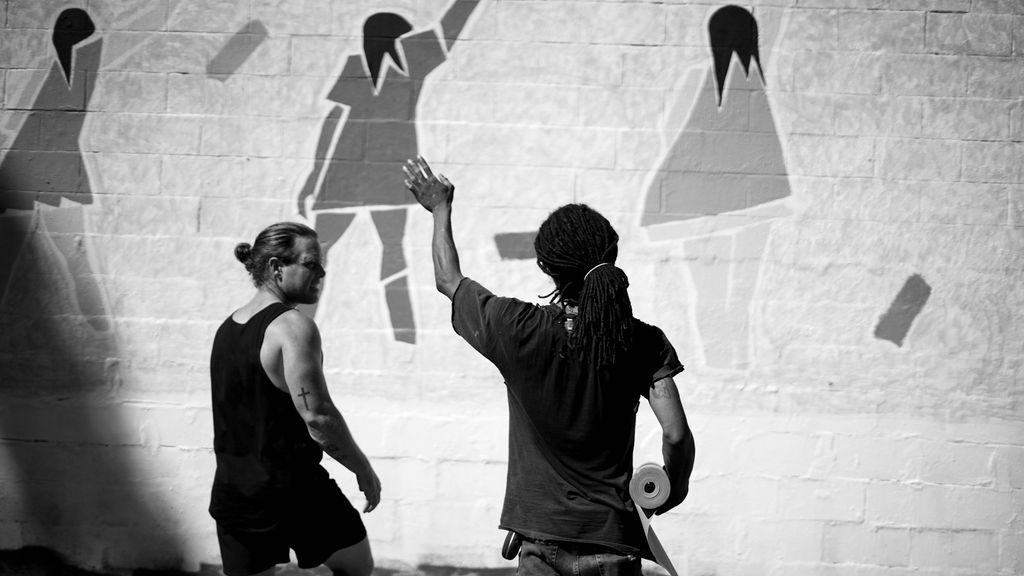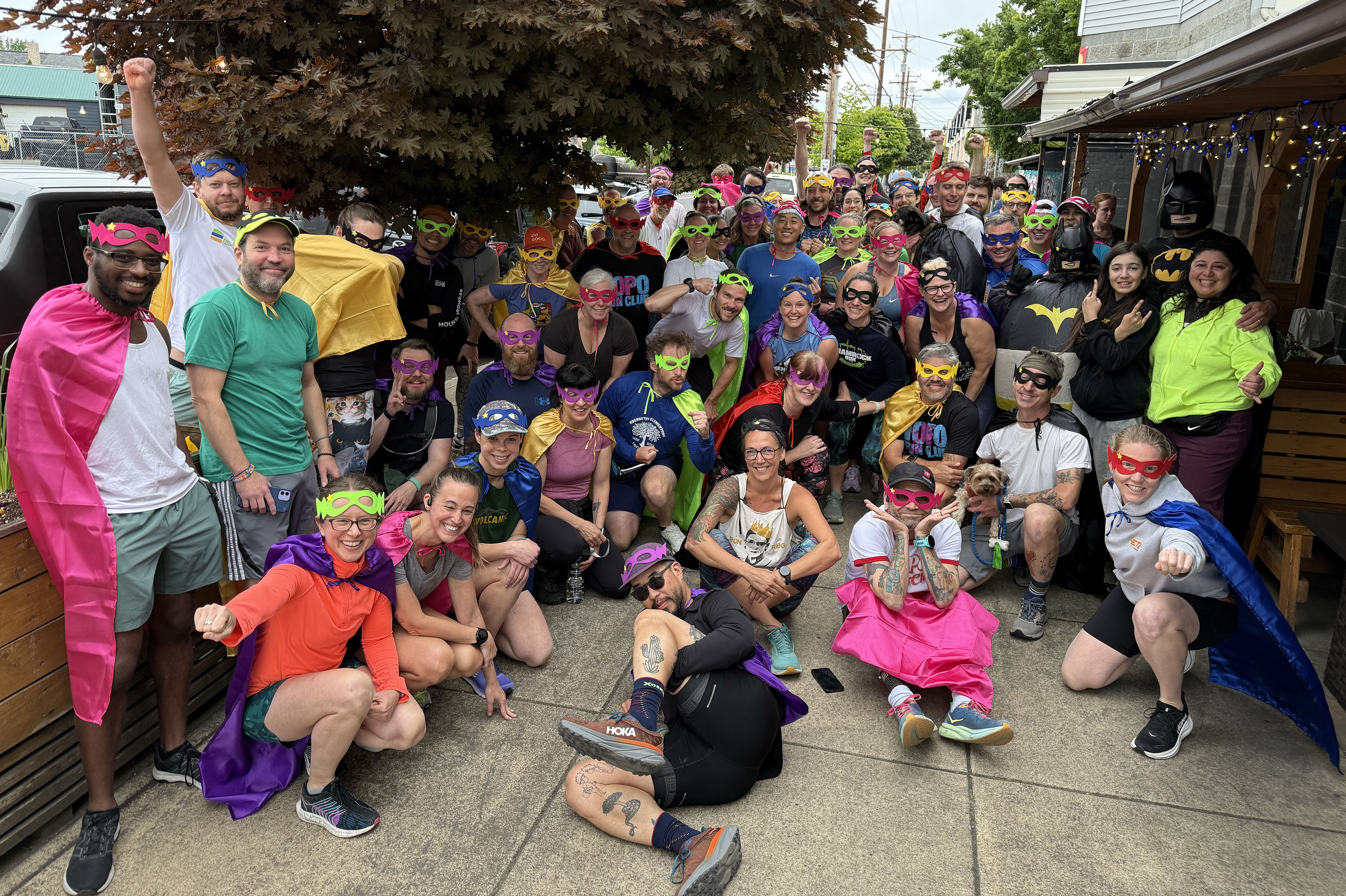One Portland Gym Owner on the Pandemic and the CrossFit Controversy

Blue House's new mural on the gym's exterior wall is "something for the community," owner Anton Fero says.
Image: Leilani Banuelos
Hundreds of gyms around the world have recently disaffiliated from CrossFit, the high-intensity fitness brand founded in 2001 that combines Olympic weightlifting, gymnastics, and metabolic conditioning, in response to former CEO Greg Glassman's racist tweets about the killing of George Floyd. Professional athletes have withdrawn from participating in the annual CrossFit Games. Even CrossFit's long-time sponsor, Reebok, has cut ties.
But cutting off that brand identity comes with a price, says one Portland gym owner, a former CrossFit affiliate who is left charting an uncertain course forward (a double whammy, considering that many people are still avoiding indoor fitness classes given coronavirus transmission concerns).
The way forward for many gym owners is marked with uncertainty: How do you market your gym without the CrossFit name? How do you set yourself apart? Without the affiliate license, what’s the glue holding everything together?
Portland gym owner Anton Fero is one of many who was frustrated with CrossFit’s silence in the wake of the recent wave of Black Lives Matter protests; for him and for many others, Glassman’s inflammatory tweets were the last straw. He wouldn’t reaffiliate, despite Glassman’s subsequent resignation and a new CEO, but he’s still figuring out what this means for Blue House, formerly CrossFit Blue House, going forward.
“As affiliate owners, we didn’t get as much as you’d think from CrossFit Headquarters other than really a name, so that was always kind of an issue,” Fero told Portland Monthly. “They're not really involved with the affiliates even though they say the affiliates are everything, so that always kind of bothered me. And once Greg Glassman came out with some of his remarks, we didn’t want to be associated with that. We didn’t really feel like that represented the CrossFit community in general. We thought, ‘If we’re actually going to be allies to the Black community, then we actually have to put things into practice.’”
For Fero, taking a stance means more than simply getting rid of the CrossFit name. Every Monday, Blue House members have been doing a memorial workout for a Black person who has been killed by police brutality. Next month, they’re planning on having an open discussion at the gym about racial injustice, which several gym members have volunteered to lead.
Blue House’s efforts go beyond the walls of the gym—literally. Wanting to respond with something that would be not only for members but for the greater Portland community, they recently hired a Black artist to paint a mural on the exterior wall of the gym. The mural depicts three women of different races holding a torch next to the quote, “Our liberty is bound together.”
Fero started the gym out of his garage four years ago, inviting people off the streets to join him for a workout. When class sizes quickly grew to 30+ people, the city of Portland called Fero and threatened to shut it down if he didn’t find somewhere else to go. Pivoting to online fitness classes for several months while searching for a new space (serendipitously mastering the art of online classes years prior to the pandemic), he went on to transform an abandoned building off of N. Fessenden into CrossFit Blue House, offering CrossFit, personal training, and specialty classes for all ages. Fero sees CrossFit as more than just a methodology, a sport, and an internationally recognized organization. "It’s a family,” says Fero. “It’s culture, really. When you go into a CrossFit gym, you know what you’re getting. It’s community. It’s really good fitness. It’s good coaching.”
Now he has to figure out how to communicate to people that he’s still running a “functional fitness gym” without explicitly mentioning CrossFit.
“It’s been really weird,” Fero says. “I don’t know how you do that. I’ve never done that. But we’ve had a handful of people join since we reopened June 15th. That’s been interesting to me—I’m like, ‘How are we growing when we’re not CrossFit Blue House?’ But really, we’ve created a neighborhood gym that people talk about. People in the neighborhood call us and say ‘We’ve heard great things about your gym.’ I still think at the end of the day, if you do a good job and you train people and they get fitter, they’ll tell their friends. It’s that simple.”
And he’s not closing the door on ever returning to the CrossFit fold, providing the company makes some big changes. To date, the company has made statements of solidarity and hired a new CEO, Eric Roza.
“Honestly, in the last month, CrossFit HQ has done more than I’ve seen them do in four years,” Fero says. “I am really encouraged, and I’ve always said I would affiliate if there were lots of changes, and they’ve already made some. They’re offering a scholarship funded Level 1 Coaching Certificate Course, which is usually $1,000, a big barrier of entry for people who come from communities who can’t afford stuff like that. They’re giving away training, they just sent me an email of all this nutrition stuff for free, they sent the whole CrossFit Kids training program out to affiliates…so they’re doing things they’ve never done, which is amazing. If they keep doing what they’re doing, making consistent changes weekly, that’s really encouraging.”
Since Blue House’s current affiliate license doesn’t expire until October, they still have a few months to see how things play out. “Even if we do affiliate,” says Fero, “we’re going to be a different gym.” If anything, CrossFit would be one of several services offered—among nutrition, personal training, kids programs, and more—but it wouldn’t be in the name. “I love CrossFit. It’s not like they have to become absolutely perfect. I think it just needs to be going in the right direction.”




